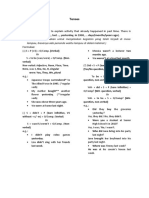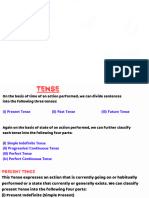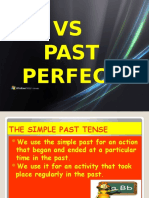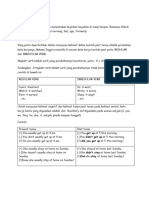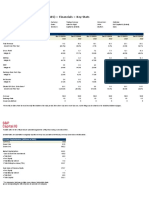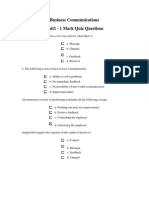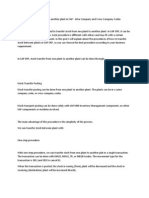0 ratings0% found this document useful (0 votes)
16 viewsEnglish - Group 6
English - Group 6
Uploaded by
Ajeng kenvanysahThe document discusses the simple past tense and past continuous tense in English.
The simple past tense is used to talk about completed actions in the past, using time words like yesterday, last week, in 2004, etc. Examples of simple past tense sentences are given using both nominal (noun) and verbal (verb) structures.
The past continuous tense expresses activities that were ongoing at a specific time in the past, using helping verbs like "was" or "were" plus the "-ing" form of the main verb. Examples are provided to illustrate the positive, negative, and interrogative forms of the past continuous tense.
Copyright:
© All Rights Reserved
Available Formats
Download as PPTX, PDF, TXT or read online from Scribd
English - Group 6
English - Group 6
Uploaded by
Ajeng kenvanysah0 ratings0% found this document useful (0 votes)
16 views7 pagesThe document discusses the simple past tense and past continuous tense in English.
The simple past tense is used to talk about completed actions in the past, using time words like yesterday, last week, in 2004, etc. Examples of simple past tense sentences are given using both nominal (noun) and verbal (verb) structures.
The past continuous tense expresses activities that were ongoing at a specific time in the past, using helping verbs like "was" or "were" plus the "-ing" form of the main verb. Examples are provided to illustrate the positive, negative, and interrogative forms of the past continuous tense.
Original Title
PPT ENGLISH_GROUP 6
Copyright
© © All Rights Reserved
Available Formats
PPTX, PDF, TXT or read online from Scribd
Share this document
Did you find this document useful?
Is this content inappropriate?
The document discusses the simple past tense and past continuous tense in English.
The simple past tense is used to talk about completed actions in the past, using time words like yesterday, last week, in 2004, etc. Examples of simple past tense sentences are given using both nominal (noun) and verbal (verb) structures.
The past continuous tense expresses activities that were ongoing at a specific time in the past, using helping verbs like "was" or "were" plus the "-ing" form of the main verb. Examples are provided to illustrate the positive, negative, and interrogative forms of the past continuous tense.
Copyright:
© All Rights Reserved
Available Formats
Download as PPTX, PDF, TXT or read online from Scribd
Download as pptx, pdf, or txt
0 ratings0% found this document useful (0 votes)
16 views7 pagesEnglish - Group 6
English - Group 6
Uploaded by
Ajeng kenvanysahThe document discusses the simple past tense and past continuous tense in English.
The simple past tense is used to talk about completed actions in the past, using time words like yesterday, last week, in 2004, etc. Examples of simple past tense sentences are given using both nominal (noun) and verbal (verb) structures.
The past continuous tense expresses activities that were ongoing at a specific time in the past, using helping verbs like "was" or "were" plus the "-ing" form of the main verb. Examples are provided to illustrate the positive, negative, and interrogative forms of the past continuous tense.
Copyright:
© All Rights Reserved
Available Formats
Download as PPTX, PDF, TXT or read online from Scribd
Download as pptx, pdf, or txt
You are on page 1of 7
SIMPLE PAST TENSE
AND PAST CONTINUOUS
TENSE
Annisa Adinda
Putri
Harahap
Lamhot
Parulian
Hutauruk
Setia Juwita
Panjaitan
Simple Past Tenses
Definition :
The simple past tense, sometimes called the preterite, is used to talk about a
completed action in a time before now. The simple past is the basic form of
past tense in English. The time of the action can be in the recent past or the
distant past and action duration is not important.
Formula Simple Past Tense :
Nominal
(+) Subject + be (was/were) + Non Verb + Object
(-) Subject + be (was/were) + NOT + Non Verb + Object
(?) be (was/were) + Subject + Non Verb + Object? (-?)
Verbal
(+) Subject + Verb 2 + Object
(-) Subject + Didn’t + Verb 1 + Object
(?) Did + Subject + Verb 1 + Object
The Use of
Example for Simple Past
Signal Time Simple Past Tense
of Simple Tense Nominal
Past We use it with
(+) I was fifteen years old last year.
(-) I was not fifteen years old last year.
Tense finished actions, (?) was I fifteen years old last year?
yes, I was. / No, I was not.
Yesterday states or habits in
Last Monday the past when we (+) They were here two hours ago.
(-) They were not here two hours ago.
An hour ago have a finished (?) Were they here two hours ago?
Last night time word Yes, they were. / No, they were not.
Verbal
Last week (yesterday, last (+) We watched a football match
In 2004 week, at 2 o'clock, yesterday.
(-) We didn't watch a football match
The other day in 2003). yesterday.
(?) Did we watch a footbal match
Last year Example : yesterday?
I went to the Yes, we did. / No, we did not.
cinema yesterday. (+) She drank a glass of milk this
We spent a lot of morning(-) She didn't drink a glass of
milk this morning.
time Japan in (?) Did she drink a glass of milk this
morning?
2007. Yes, she did. / No, she did not.
SIMPLE PAST CONTINUOUS TENSE
Definition of the past continuous tense :
General understanding past continuous tense sentence is a
sentence that states the events taking place in the past. On t
he use of
Past Continuous Tense verb used must end with-ing /
(Verb + ing). Past Continuous Tense form of time using this
type of "TO BE" (was / were).
Signal Time of Past Continuous Tense :
When, While, As, Al day yesterday, and than The whole day l
Formula past Sentence type The formula
continuous positve(+) S + be(was/were) + V1-ing/present participle
tense
negative(-) S + be(was/were) + not + V1-ing/present participle
The use of past interogative(?) be(was/were) + S + V1-ing/present participle?
continuous tense :
Past Continuous is used to
express the following : Example for past continuous tense
Stating activities being carried
out at a specific time in the (+)The team was running
past (-)The team was not running
Example : (?) Was the team running?
We were gardening at 7 a.m
yesterday. (+) The workers were queuing
He was eating at 8 p.m last (-) The workers weren’t queuing
night. (?)Were the workers queuing?
THANK YOU FOR
YOUR ATTENTION!
You might also like
- Apply Size Premium MetricsDocument4 pagesApply Size Premium MetricsmarianoveNo ratings yet
- English Tenses: 1. Simple Present TenseDocument7 pagesEnglish Tenses: 1. Simple Present TenseDhanes YuwonoNo ratings yet
- COMM11: Purposive CommunicationDocument201 pagesCOMM11: Purposive CommunicationNiña Mae Lacno Into100% (1)
- DefiningDefining Distance Education Distance EducationDocument12 pagesDefiningDefining Distance Education Distance EducationCedie LooNo ratings yet
- Tenses+Part+IIDocument21 pagesTenses+Part+IIKrisna Budi JuliantoroNo ratings yet
- Group The Power Puff AND Two Prince: Benny J Cindy O Shilvi T Zulfan (PIC)Document15 pagesGroup The Power Puff AND Two Prince: Benny J Cindy O Shilvi T Zulfan (PIC)Cindy OktavianaNo ratings yet
- Nesti Puji Astuti - 5117011 - Perbaikan NilaiDocument24 pagesNesti Puji Astuti - 5117011 - Perbaikan NilaiNesti PujiaNo ratings yet
- Contoh Kalimat Simple Present Tense, Simple Past Tense, Simple Present Future, Present Continuous, Present PerfectDocument10 pagesContoh Kalimat Simple Present Tense, Simple Past Tense, Simple Present Future, Present Continuous, Present PerfectdoubleulandNo ratings yet
- Tenses 5-8Document11 pagesTenses 5-8OliviaNo ratings yet
- Chapter V Tenses (Bahasa Inggris)Document40 pagesChapter V Tenses (Bahasa Inggris)jaenili78No ratings yet
- Simple Present Countinuous TenseDocument15 pagesSimple Present Countinuous TenseNazarudinNo ratings yet
- 16 Tenses in English ALIAMSAH RITONGA DoDocument9 pages16 Tenses in English ALIAMSAH RITONGA Doindah pratiwiNo ratings yet
- K 2Document20 pagesK 2Nadea OctaryanaNo ratings yet
- Simple Past Tense: Kalimat Nominal Kalimat VerbalDocument1 pageSimple Past Tense: Kalimat Nominal Kalimat VerbalWulan JunitaNo ratings yet
- Simple Perfect TenseDocument2 pagesSimple Perfect TensesopyanNo ratings yet
- Simple Present TenseDocument12 pagesSimple Present TenseAstik FitriaNo ratings yet
- Past Tense and Past ContinuousDocument2 pagesPast Tense and Past ContinuousAltur 'Johanes' LubisNo ratings yet
- English Tenses: Group 2 Bki 2FDocument20 pagesEnglish Tenses: Group 2 Bki 2FZahra MahmudiNo ratings yet
- Tenses in EnglishDocument4 pagesTenses in EnglishJhonytowengtoweng Indigo DudulNo ratings yet
- Materi TENSES KELOMPOK 1Document46 pagesMateri TENSES KELOMPOK 1Farhan GustamaNo ratings yet
- Rangkuman 16 TensesDocument7 pagesRangkuman 16 Tensesbayu ajikuncoro565No ratings yet
- 16 Simple Pas TenseDocument7 pages16 Simple Pas TenseBrow Nies ParlayNo ratings yet
- TENSESDocument34 pagesTENSESLalu FahrurroziNo ratings yet
- Structure TensesDocument20 pagesStructure TensesVeronika Anastasya Br PurbaNo ratings yet
- Kalimat Positif (+) : S+ Be (Was/were) + Verb (-Ing)Document2 pagesKalimat Positif (+) : S+ Be (Was/were) + Verb (-Ing)kelvinNo ratings yet
- Past TenseDocument9 pagesPast Tensesecret147No ratings yet
- Group 2 Written ReportDocument12 pagesGroup 2 Written ReportPRECIOUS KAYE MARIE BANTIGUENo ratings yet
- B.inggris Simple Past TenseDocument12 pagesB.inggris Simple Past TenseSririzkii WahyuniNo ratings yet
- All TensesDocument11 pagesAll TensesRofiqah AzmiNo ratings yet
- Outer Galaxies Astronomy Education Center by SlidesgoDocument10 pagesOuter Galaxies Astronomy Education Center by SlidesgoAmyyy FsNo ratings yet
- Past Tense (Waktu Lampau)Document4 pagesPast Tense (Waktu Lampau)wahyuNo ratings yet
- Middle Test English Tenses SaskiaPBI SalinanDocument4 pagesMiddle Test English Tenses SaskiaPBI SalinanIphone XrNo ratings yet
- B Inggris 2Document12 pagesB Inggris 2Komang Ghosagotama AryayustamaNo ratings yet
- Tenses: Simple Present Tense, Simple Past Tense Simple Future TenseDocument39 pagesTenses: Simple Present Tense, Simple Past Tense Simple Future TensedeanisaNo ratings yet
- 16tens HukumDocument42 pages16tens Hukumlathif zdayNo ratings yet
- Present Continuous. Past Continuous. Future Continuous TenseDocument3 pagesPresent Continuous. Past Continuous. Future Continuous TensepeeeanuttsNo ratings yet
- Materi TensesDocument5 pagesMateri Tensesthomas SaragihNo ratings yet
- Change The Following Verbal Sentences Into The Correct Forms - Past TenseDocument7 pagesChange The Following Verbal Sentences Into The Correct Forms - Past TenseToto HerwiantoNo ratings yet
- 16 Tenses in English: Name: Felini O. Toporundeng NIM: 16603145 Class: V/C Bahasa Inggris 4 "Public Administration"Document6 pages16 Tenses in English: Name: Felini O. Toporundeng NIM: 16603145 Class: V/C Bahasa Inggris 4 "Public Administration"Felini ToporundengNo ratings yet
- Simple Past Tense & ContinuousDocument17 pagesSimple Past Tense & ContinuousshellagherinaNo ratings yet
- TensesDocument6 pagesTenses1870sharmerNo ratings yet
- Yesterday: Kemarin Yesterday Morning: Kemarin Pagi Last Monday: Hari Senin LaluDocument14 pagesYesterday: Kemarin Yesterday Morning: Kemarin Pagi Last Monday: Hari Senin LaluSartiNo ratings yet
- ENGLISH NOTES CLASS 10thDocument2 pagesENGLISH NOTES CLASS 10thdynamicgaming056No ratings yet
- English TenseDocument39 pagesEnglish TenseTesso RarNo ratings yet
- Present Tense (Waktu Sekarang)Document14 pagesPresent Tense (Waktu Sekarang)Ghulam FajriNo ratings yet
- Tenses Bahasa InggrisDocument12 pagesTenses Bahasa InggrisAl Adrian Dwi ANo ratings yet
- Tense: Politeknik META Industri - EnglishDocument21 pagesTense: Politeknik META Industri - EnglishDinda BhestariNo ratings yet
- FLSP Integrated 16 Maret 2020Document28 pagesFLSP Integrated 16 Maret 2020Retno Diajeng PutriNo ratings yet
- Materi 16 Tenses EFCDocument17 pagesMateri 16 Tenses EFCNekiNo ratings yet
- Present Perfect TenseDocument11 pagesPresent Perfect TenseIrfan NurNo ratings yet
- Powerpint InggrisDocument13 pagesPowerpint InggrisMarnia Latua NainggolanNo ratings yet
- Makalah TensesDocument18 pagesMakalah TensesIka NirmalasariNo ratings yet
- Kelas 8 PJJ 6 Past TenseDocument25 pagesKelas 8 PJJ 6 Past TensePrima Alexandra MuhajirNo ratings yet
- Past Tense - Present PerfectDocument12 pagesPast Tense - Present Perfectsalsabilftr.offcialNo ratings yet
- Past TenseDocument4 pagesPast TensedepaNo ratings yet
- Present Perfect TenseDocument11 pagesPresent Perfect TenseIrfan NurNo ratings yet
- TenseDocument55 pagesTenseYashaNo ratings yet
- Past TenseDocument2 pagesPast Tensethomas SaragihNo ratings yet
- 16 Tenses in EnglishDocument8 pages16 Tenses in EnglishNovaSoniaChuaNo ratings yet
- Present TenseDocument7 pagesPresent TenseANDRI ADITNo ratings yet
- Past Simple: By: Miftah MaryanaDocument12 pagesPast Simple: By: Miftah MaryanaMiftah MaryanaNo ratings yet
- SMKN 2 Buduran SidoarjoDocument40 pagesSMKN 2 Buduran Sidoarjocindy75% (8)
- Straco Corporation Limited SGX S85 FinancialsDocument80 pagesStraco Corporation Limited SGX S85 FinancialsP.RaviNo ratings yet
- IsiDocument2 pagesIsiLavanya DaivasikhamaniNo ratings yet
- PWCDocument4 pagesPWCSALONI BHATIA 2019017No ratings yet
- Gis Instrument Transformers EngDocument4 pagesGis Instrument Transformers EngCarlos CarreraNo ratings yet
- Question Bank of Business Communications - 1markDocument33 pagesQuestion Bank of Business Communications - 1marklakkuMS83% (6)
- Numerical Methods Test 1Document17 pagesNumerical Methods Test 1Ashley StraubNo ratings yet
- Sickness Body PartsDocument13 pagesSickness Body Partsm.s.subramania sharmaNo ratings yet
- Archer Space Brochure ScreenDocument12 pagesArcher Space Brochure ScreenJoan StewartNo ratings yet
- Janssen GDocument35 pagesJanssen Gfs4xmcnbj8No ratings yet
- Marginal Costing AND AnalysisDocument19 pagesMarginal Costing AND AnalysisRuchi BansalNo ratings yet
- PANSITDocument42 pagesPANSITMaenard TambauanNo ratings yet
- New Fire ExtinguisherDocument1 pageNew Fire ExtinguisherAngelo LagoNo ratings yet
- Power BiDocument16 pagesPower Bi2qqjnhkcftNo ratings yet
- Food & Function: The Texture, Sensory Properties and Stability of Cookies Prepared With Wax OleogelsDocument11 pagesFood & Function: The Texture, Sensory Properties and Stability of Cookies Prepared With Wax OleogelsNovriamanNo ratings yet
- CaseDocument3 pagesCaseRIYASHREE KUKREJANo ratings yet
- N0. 5/2 (T/NT) /2020/data Bank/Pers.: Wapcos LimitedDocument1 pageN0. 5/2 (T/NT) /2020/data Bank/Pers.: Wapcos LimitedPrashant TrivediNo ratings yet
- Nba Team Business PlanDocument7 pagesNba Team Business Planmr3m3cch100% (1)
- Paper # 068 - Sag & Ball Mill Control by Model Predictive Controllers On 3 Lines at CollahuasiDocument23 pagesPaper # 068 - Sag & Ball Mill Control by Model Predictive Controllers On 3 Lines at CollahuasicarloscjunoNo ratings yet
- TDS Fosroc Nitocote CM210 India3Document4 pagesTDS Fosroc Nitocote CM210 India3reshmitapallaNo ratings yet
- Stock Transfer From A Plant To Another Plant in SAPDocument4 pagesStock Transfer From A Plant To Another Plant in SAPCristiano LimaNo ratings yet
- Full Download Effective Cybersecurity A Guide to Using Best Practices and Standards 1st Edition William Stallings PDF DOCXDocument62 pagesFull Download Effective Cybersecurity A Guide to Using Best Practices and Standards 1st Edition William Stallings PDF DOCXbaitblocks100% (1)
- Physical-Education10 Q1 Mod1 Recreational-Activities V1Document32 pagesPhysical-Education10 Q1 Mod1 Recreational-Activities V1bayalien nile100% (1)
- Unit 8 Roof Trusses: StructureDocument24 pagesUnit 8 Roof Trusses: StructureanbugobiNo ratings yet
- Preload InstallerDocument2 pagesPreload InstallerwwfyriNo ratings yet
- 1 Fjune 2022 MsDocument24 pages1 Fjune 2022 Msj6cmckqmxxNo ratings yet
- HikCentral Professional V1.5Document24 pagesHikCentral Professional V1.5mackyNo ratings yet
- CAT C9 Major Overhaul Service Report1Document28 pagesCAT C9 Major Overhaul Service Report1MUHAMMAD ASRI BIN ABDUL RAHMANNo ratings yet
















